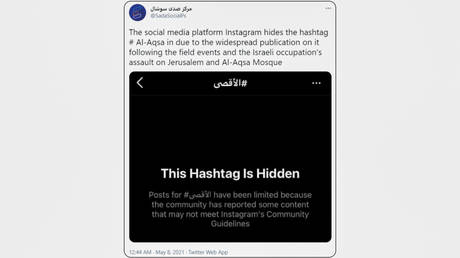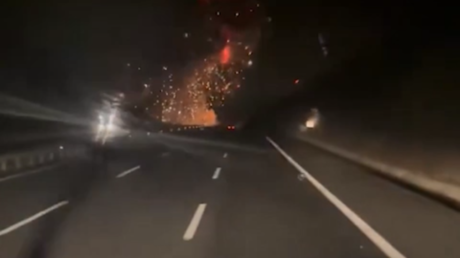
Days after Instagram and Twitter blamed “system errors” for deleted posts on unrest in Jerusalem, a a coalition of civil society groups and digital rights activists have accused them of continuing to “censor” Palestinian content.
Palestinians facing eviction from occupied East Jerusalem’s Sheikh Jarrah neighborhood have taken to social media to protest. Since last week, reports have emerged of some posts, photos and videos being removed and accounts being blocked for reportedly violating community standards.
In a joint statement on Monday, more than 20 groups called out Facebook and Twitter for “systematically silencing users protesting” and urged them to implement “transparent and coherent content moderation policies.”
Terming the scale of the content takedowns as “egregious and pronounced,” the signatories said they were indicative of a “wider pattern of consistent censorship of Palestinian and allied voices” that has been “documented for years.”
According to Instagram and Twitter, the accounts were “suspended in error by our automated systems.” A Reuters report stated that both platforms had apologized and claimed “the issue had been resolved and content reinstated.”
In a statement on Friday, Instagram said that an automated update last week had caused content that was reshared by multiple users to appear “as missing,” which impacted “tens of millions of stories,” including posts on Sheikh Jarrah and other troubled areas.
“We are so sorry this happened. Especially to those in Colombia, East Jerusalem, and indigenous communities who felt this was an intentional suppression of their voices and their stories – that was not our intent whatsoever,” the Instagram statement said.
But on Monday, one of the statement’s signatories, 7amleh, a nonprofit Palestinian digital rights advocacy group, said it had received over 200 complaints on deleted posts and suspended accounts about Sheikh Jarrah. The group noted that reports were still coming in.
Its director, Nadim Nashif, said that the restoration of deleted content and accounts notwithstanding, the explanations offered by Instagram and Twitter did not “sound logical” and termed it “weird” for the companies to equate what is happening in Jerusalem with other issues elsewhere.
“We haven’t managed to get a transparent, clear system of content moderation. The keyword here is transparency and equality, because this is not happening on the Israeli side,” Nashif told the Arab News website.
Another signatory, digital rights group Access Now, claimed the “issue was not resolved” and said it was no longer acceptable for platforms to use “system glitches” as an excuse.
Noting that the episode showed why using algorithms as content moderators was a “terrible idea,” Marwa Fatafta, the group’s Middle East and North Africa policy adviser, told Reuters that tech companies needed to be “transparent about the systems they use” and “ensure they do not infringe on people’s rights in such a discriminatory and arbitrary manner.”
Neither Facebook nor Twitter have issued follow-up statements as yet.
Instagram has previously courted controversy over Palestinian issues, notably deleting a post last July by supermodel Bella Hadid showing her father’s US passport with his birthplace listed as Palestine – for violating “community guidelines on harassment or bullying.”
“Are we not allowed to be Palestinian on Instagram? This, to me, is bullying. You can’t erase history by silencing people. It doesn’t work like that,” Hadid said at the time.
If you like this story, share it with a friend!




